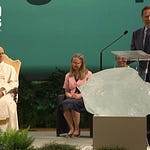We are not ready for what’s coming. Worse than that, we’re deliberately making sure we don’t think about what’s going to be required to adapt to the climate we’ve created and is becoming clear. No amount of tax revenue will be sufficient to build flood defences high enough to prevent some towns washing away. Our hard infrastructure - rail, road, energy, buildings, heating and cooling, water (both for getting it and getting rid of it) - is built for a benign climate that is already in the rear-view mirror. And few people want to talk about that. 1
If civilisation is a ship, and we’ve been dithering and arguing about how to avoid the storm in our path or who set the course to hit it, we’ve now entered the edge of the storm. Some people have realised that, and that we’re entering a different phase. And tentatively they’ve started to speak up.
Baroness Brown, who heads up adaptation for the UK Climate Change Committee, the official body telling government whether it’s on track to meet its objectives, sent a letter to the UK government overnight with a simple message: the best case scenario is that at a minimum, we can now expect the world to warm at least 2°C by 2050. And that it makes no sense now to plan for anything other than a world that is up to 4°C warmer by 2100.
Even then, the message is hard to articulate in a way that people are ready to hear. When Baroness Brown told Justin Webb on BBC Radio 4’s Today programme this morning, he had two questions. 1) So that means bigger flood defences? 2) And how does that fit into the Government’s ‘growth agenda’.
The target to stay under 1.5°C was in the Paris Agreement for a reason. Back in 2015 it was thought that’s the maximum temperature rise we can endure while things proceed more or less as normal - some bigger storms, some damage, some loss, but with a rapid transition away from fossil fuels and other modest changes life for most will be familiar.
We now know that 1.5°C itself isn’t “safe”, that above 2.0°C we can expect huge disruption. And in a 4°C warmer world we can expect catastrophic impacts on human systems that are hard even to model.
That one of the BBC’s top journalists can muster no more reaction than “so…sea walls? Sounds expensive” when Baroness Brown - severely limited in what she can say by the Climate Change Committee’s own rules - is telling you that literally every part of life in the UK needs to be rethought in light of adaptation and we have 20 years to do it? That should chill your blood. Because we seem not to know how even to start talking about what's already happening.
Hitting the Overshoot Alarm
Fortunately some people have been doing more than others to get ready for these conversations. Overshoot, a new four-part documentary series from climate strategist and Wicked Problems alum Laurie Laybourn—goes further than nearly anyone has before. And he came back to unpack some of the key ideas in Overshoot and what he hopes people will do with it.
In Overshoot the story starts with the fact that we can no longer avoid the storm, we’ve enetered it. How to survive and steer through it—generation after generation—is the conversation we urgently need to have now.
Drawing on interviews with diplomats, scientists, and communities on the frontlines, Laybourn dismantles the win/lose logic that has dominated climate politics since Paris and asks what it means to live in an age of overlapping crises and hard adaptation choices.
Our conversation ranges from the myth of Easter Island to the politics of “carbon sucking,” from managed retreat in Wales to the legal aftershocks of 1.5°C’s failure. It’s a clear-eyed look at what comes next—and why, even at the moment of “net zero,” we’ll be living in the most dangerous period in human history.
Listen/watch the interview, and listen to the three episodes out now - beautifully produced with loads of voices you’ll find familiar if you’re a Wicked Problems regular - the fourth instalment drops Monday 20th October in all the good places including overshootpod.com.
Breaking Through
Overshoot is a crucial effort in trying to get reality into our conversations. But consider - Brown’s letter comes a day after this Guardian headline:
“Towns may have to be abandoned due to floods with millions more homes in Great Britain at risk
Every constituency projected to be at greater risk, with many areas likely to be uninsurable, Guardian investigation finds”
But this isn’t new, of course. We’re 12 years since it was decided that the village of Fairbourne in Wales, sitting on reclaimed wetlands between the mountains and the Irish Sea, would not be defensible with expected rise in sea level and in storm intensity. So the 700 residents of the village would need to be leave within a few decades.
But there would be no support to residents to relocate. And as the news trickled out, the market reacted. The Guardian in 2019 reported from Fairbourne on what happened next:
As word of the council’s decision spread, house sales fell through and prices collapsed. Some residents simply stopped maintaining their homes and gardens. Others formed a campaign group, claiming that the reporting of the plan was misleading, and that the village had been unfairly singled out by Gwynedd. They argued that flooding was much worse in Aberystwyth, Barmouth and Borth in 2014.
The campaign petered out when key members moved away, but much of the bitterness remains. Wilkins, one of the original campaigners, feels the village has been badly treated. “There are hundreds of residents in Fairbourne,” she says, as we talk in her living room. “We’ve got the little railway. We’ve got the shops. We’ve got a post office. We are a thriving community, and that’s all going to be wiped out. I don’t like to think about it.”
Houses have started to sell again, but only to cash buyers looking for bargains; some calculate they can make a profit from rental income in the time Fairbourne has left. However, many of the villagers cannot drop their asking prices £40,000 or £50,000 below the already depressed market rate for the area, because they could not afford to buy anywhere else.
Fairbourne became synonymous with a failed attempt at grappling with reality. It is the ghost that haunts every planner and decision maker and insurer who are warned that they might be the one to start a collapse. Will we adapt our politics? Or is the lesson people learned from Fairbourne that there is zero upside in being honest.
The problem is a lot older than 2013, of course. On the day Laurie and I were speaking, there was reason to be reminded of the story of Jonah and the whale. Jonah could easily slot in as a character in a 21st century prestige drama as a complete anti-hero who keeps trying to do anything they can to avoid having to do the right thing. He’s told to go to another city to call out the things they’re doing wrong, and instead works on a ship headed in the opposite direction to get as far away as possible. But the ship he’s on hits a storm - and the crew freak out. Eventually they find out that it’s basically Jonah’s fault, because he’s failed to do what he was supposed to do - confront the thing going wrong. And to appease the gods, they throw him over the side. Cue whale and three days spent in its belly.
The whole experience of being eaten by the whale and getting vomited out takes up just two lines. The rest of the story is about how far people will go to not look squarely at a problem - fooling themselves and fooling others into thinking it’s not something they have to deal with.
So we brought Laurie back for an extra few minutes, where we talk about Jonah, Greta Thunberg, and how far we have to go to face the future we’re in for.
SAFER (amended)
We were trying to do too many things at once and meant to include a mention here - as we do in the episode - of the work the Climate Majority Project (cofounded our friend Rupert Read) has been doing that provides an answer to the “wtf do we do now?” prompted by Laurie Laybourn’s Overshoot documentary series and Baroness Brown’s letter from this morning warning that 2°C is the least warming we should be planning for.
They’ve started a petition - months before Baroness Brown broke cover - calling out the fact that in the UK we’re way behind the curve. And the UK is ahead of most other places on Earth - so that should freak you the f out if you’re paying the least bit of attention.
Fortunately there are a few - Rupert Read, Caroline Lucas and the Climate Majority Project team have been pushing for a properly-funded plan to address the adaptations the UK will need - https://petition.parliament.uk/petitions/730062












